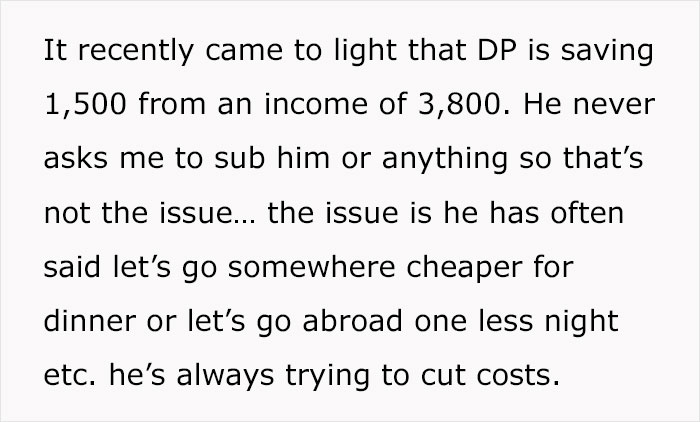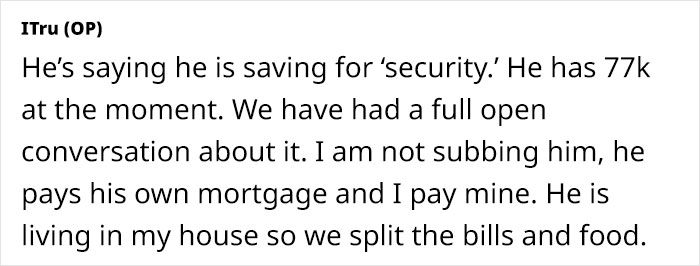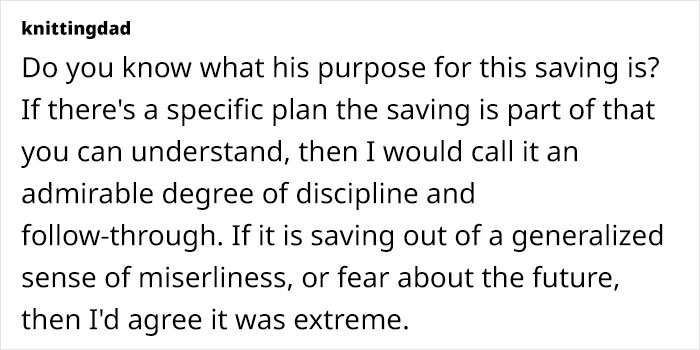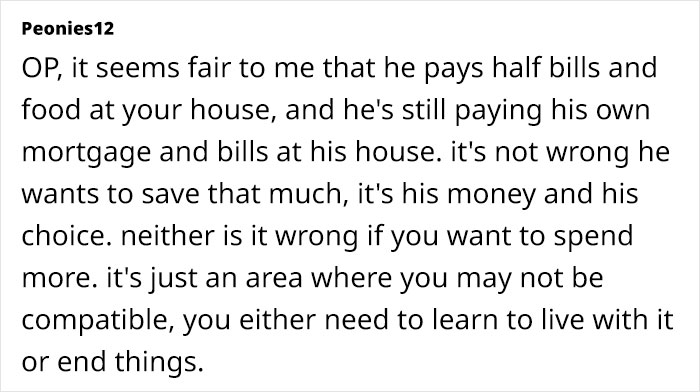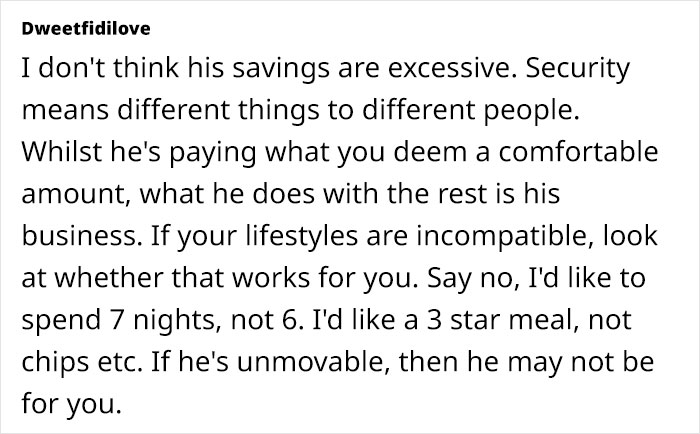Overspending is usually the biggest cause of problems in relationships, but in this one, excessive thriftiness caused some issues. It also made people question how much is too much when it comes to saving money. More info: Mumsnet
Everyone’s taught to save up for a rainy day, but some folks take that saying a bit too seriously
Share icon Image credits: HelloDavidPradoPerucha / Freepik (not the actual photo)
The poster shared that she and her partner would split food bills and the cost of heating for her home and that he still managed to save $1,500 of his salary
Share icon Share icon Share icon Image credits: SHVETS production / Pexels (not the actual photo)
When she found out how much he was saving, she felt annoyed that he avoided splurging and kept choosing the cheapest options
Share icon Share icon Image credits: ITru
The woman asked netizens if she was wrong to think her partner’s saving habits were a bit too extreme
The poster had recently found out that her partner had been saving $1500 from his salary of $3800. Although he never asked her to cover his expenses and always split bills with her, she felt annoyed that he didn’t spend money on luxuries and always tried to cut costs. When she asked netizens if she was wrong to think of his saving habits as extreme, the comments were divided. That’s why Bored Panda contacted Bola Sokunbi, a Certified Financial Education Instructor (CFEI), finance expert, 4-time bestselling author, speaker, and founder of Clever Girl Finance-one of the largest personal finance media/education platforms for women in the U.S. We asked her whether she thought the woman’s partner was being too extreme with his saving habits. Bola said that “it seems like her partner is definitely prioritizing his savings, but whether it’s extreme depends on his personal goals and mindset around money. Saving $1,500 from $3,800 (about 39%) is quite a significant portion of his income, which might feel extreme to her, especially if it impacts their shared experiences, like going out for dinner or vacations.” “It’s possible that he has a goal he’s really focused on, but without clear communication, it can come across as excessive or unbalanced to his partner. It definitely sounds like a deeper conversation between them would help and is needed. They need to talk openly about their individual goals around money and how they can align them,” she added. Once a couple clarifies their thoughts about money, it helps them understand each other’s perspective. Experts also say that, after the initial discussion, partners should check in with each other at least twice a year about their thoughts and any concerns regarding their finances. We also contacted Paul Merriman, the CEO of Fairstone Ireland, who started ‘askpaul’ to provide jargon-free expert financial advice. Paul is seen as one of Ireland’s top financial advisers, with over 20 years of experience in the field and an internationally recognized CFP® certification in finance. He told us that “in relationships, financial habits can sometimes cause tension. In this case, while 40% might seem high, it could be reasonable if the person has a clear financial goal in mind, such as purchasing a home, retiring early, or building an emergency fund. Saving aggressively isn’t inherently negative, but it can feel restrictive if it comes at the cost of enjoying your present life or if it causes tension in a relationship.” Share icon Image credits: Karolina Kaboompics / Pexels (not the actual photo) The poster later told commenters that when she asked her partner why he was saving so much, he said he was doing it for “security.” Bola told us that “he could also be coming from a place of financial insecurity or fear, where saving gives him a sense of control and safety.” She also said that many people save aggressively if they’re “working toward a large financial goal, like paying off a big debt, preparing for a big purchase, or early retirement/financial independence.” Paul also suggests that “an individual might save aggressively if they have experienced financial instability in the past. Perhaps they grew up in a household where money was tight, or they went through a period of unemployment and now want to secure their future.” “Other times, people are driven by specific goals, such as building wealth or achieving financial independence at an early age. For instance, there is a growing movement known as FIRE (Financial Independence, Retire Early), where individuals save large portions of their income in order to retire decades before the traditional retirement age. In such cases, saving 40% or even more of one’s income is seen as a necessary step toward a larger, long-term objective,” Paul added. Even though the guy was apparently saving to make himself feel secure, he had already put aside a sum of $77,000. It might seem like a huge amount, especially to someone like the poster who was probaby not used to saving up to such an extent. That’s why we asked Bola if there was an ideal amount that a person should try and save from their salary. She explained that “there isn’t a one-size-fits-all answer, but a general rule of thumb is to save at least 10-20% of your income if possible.” “This can be adjusted based on individual circumstances, like debt, future goals, cost of living, and lifestyle. It’s important to save for the future while also enjoying life in the present, especially when in a relationship where both partners need to feel valued and considered–balance is key.” When it comes to determining how much a person should save, Paul also said that “financial experts generally recommend saving at least 20% of your income. This percentage allows for the accumulation of a solid emergency fund, the ability to invest for future goals, and some room for discretionary spending.” Paul shared that “If someone is saving 40% of their salary, as in this case, it’s essential to evaluate whether this is sustainable in the long term and whether it fits both partners’ financial goals and lifestyles. In relationships, it’s vital to have open discussions about financial goals and habits.” Share icon Image credits: Alexander Grey / Unsplash (not the actual photo) A very important thing Paul shared about finances is that “while saving is crucial, it should not feel restrictive or create friction between partners. Each person may have a different approach to managing their money, but compromise and communication are key.” He added that “by having honest conversations and understanding each other’s financial motivations, couples can work together to build a future that feels secure—without sacrificing happiness along the way.” Money can very often be a difficult subject for people to understand, especially because we’re not taught much about how to spend and save effectively. That’s why questions like the one asked by the poster really help us figure out where we stand on the issue. To understand your financial goals better, invest, and build long-term wealth, you can check out Bola’s new workbook called My Wealth Plan and the 2nd edition of her 1st book on personal finance. You can also get a lot of help and guidance from the wide range of askpaul financial services that you can find on Paul Merriman’s website. Don’t forget to let us know whether you think the woman’s partner was being miserly or extremely smart about money. We’d love to hear your thoughts.
Most folks felt that the guy was being sensible to save up for the future and disagreed with the woman about his saving habits being extreme
Share icon Share icon Share icon Share icon Share icon Share icon Share icon Share icon Share icon Share icon Share icon Share icon Anyone can write on Bored Panda. Start writing! Follow Bored Panda on Google News! Follow us on Flipboard.com/@boredpanda!


